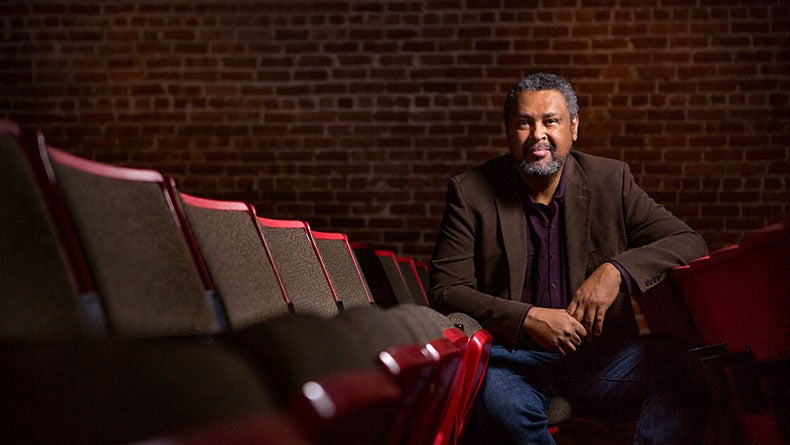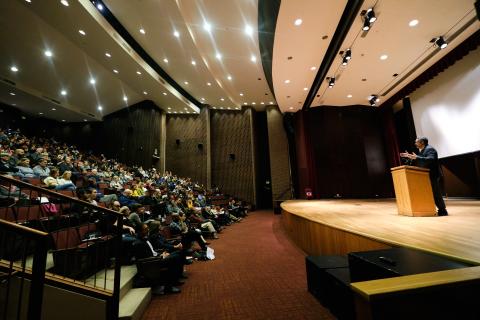Screenwriter for “BlacKkKlansman” Brings Oscar Winning Film to DU
Film based on a true story with CO roots
“Winning an Oscar is crazy and surreal,” says screenwriter Kevin Willmott. “Nothing prepares you for that.”
The victory is still fresh for Willmott, who in February won his first Oscar for his work on “BlacKkKlansman,” the Spike Lee film nominated for a total of six Academy Awards, including Best Picture and Best Adapted Screenplay. It was the second collaboration between Lee and Wilmott, who first worked together on 2015’s “Chi-Raq.” The pair also co-wrote Lee’s latest project, “Da 5 Bloods,” a story about black soldiers in Vietnam that recently started filming.
“BlacKkKlansman” is based on a true story with Colorado roots. It follows Ron Stallworth, a black police officer who infiltrated the Ku Klux Klan as a member of the Colorado Springs Police Department in the 1970s. The movie ends with footage of the 2017 riots in Charlottesville, Virginia, suggesting that some of the factors that drove Klan activities in the ’70s are still present today.
Willmott — also an associate professor of film studies at the University of Kansas — brought the film to campus in April for a screening and Q&A session with DU students. The DU newsroom caught up with him before the screening to talk about his background and his work on the film.
Q: “BlacKkKlansman” was your second film with Spike Lee, and now you are working on a third together. How did that relationship begin?
A: I made a film called “CSA: Confederate States of America,” and he heard about the film and loved it. It’s presented by Spike Lee. It took us a while to work together, but when we finally made “Chi-Raq” then I think we liked working together.
Q: How does your collaboration process work?
A: There were four writers on “BlackkKlansman.” There were two guys before us, and they were the guys that found the book and they wrote the first couple drafts of the script. When Jordan Peele approached Spike to direct the film, he said it needed a rewrite, so Spike brought me on. We typically go to his studio in Brooklyn and map out what we’re going to do, and then I’ll go back to Kansas and I usually do the first draft and I send it to him, then he makes changes and sends it back to me, and we go back and forth.
Q: As a filmmaker, was Spike a hero of yours or someone you looked up to?
A: We were in school at the same time at NYU. He had just graduated when I got there, and he had a big success with “She’s Gotta Have It” when I was there, and so he was an inspiration to everybody.
Q: You teach at the University of Kansas, and you go to other universities to talk about “BlacKkKlansman.” What do you find students are most interested in talking about when it comes to the film?
A: One thing I’ve noticed is that young people have the same experiences wherever I go. I think they’re hungry for a response to what’s happening. People are frustrated right now, with outrageous racist policies and behaviors and a leader that says all these horrible things. There’s been no real response; there’s been no real way to stop him. One of the things that I think really connects with the film is that hate is on the rise right now. I think it was always there, but it was kind of held in check. It was in the shadows, and civility — common, human American civility — kind of held it in check. And [then] we opened that door and said, “Come on out, y’all.” People are saying things, doing things, that I hadn’t heard or seen since I was a kid in the ’70s.
Q: When times are hard, politically or socially, do artists have a responsibility to step up and respond?
A: I think so. That’s one of the good things about art, and about film, in particular — that we have a way to respond. It’s tricky right now, because it used to be, in the good old days of the ’60s and ’70s, all those great satires that were made, especially in the ’70s, the problem was so well-defined. It was like, “The problem is that, right there. It’s segregation. It’s nuclear weapons.” It was clear. And it’s clear now, but it’s kind of gotten all jumbled up. The reality of American life now is so bizarre that it’s hard to satirize. You see people post stuff, like, “Really, he said that. This is not The Onion. This is not a joke.” And that’s made it challenging. It’s made it a little more complicated, how you respond.
Q: In your view of “BlacKkKlansman,” how do you see it as a response to what’s going on?
A: The thing that was timely about our film was that, even though it’s a movie about the ’70s and about hate groups in the ’70s, hate groups are on the rise now. Ending the movie with the Charlottesville footage — we had just made a movie about David Duke in the ’70s, and there he was in Charlottesville. He’s still going strong, and people are still following him and buying the lie. And not just David Duke, but that huge line of young men that were shouting, “Jews will not replace us.” It was a strong reminder that those guys have always been here, but [now] they felt emboldened, and they felt like they could show their faces. And a lot of those guys got fired afterwards. There were guys that worked at big corporate stores and had corporate jobs, and they thought they could publicly say this stuff, and there would be no response. Fortunately, there was some response, and some of those guys lost their jobs. It’s a bizarre time right now.
Q: When you were writing the screenplay, did you feel like, “OK, we can’t make these guys too comical, because then it won’t reflect how dangerous they are?” Was there a line you were trying to walk?
A: Stallworth, when he was dealing with these guys, they had planned to blow up a gay nightclub in Colorado Springs. That was their real plan. The thing that we try to do in the film, and the way that we approached the satirical elements of the film, is that we don’t tell jokes. We don’t try to make it palatable. We show you hate in its full effect. And in showing how insane hate is, that’s where you find the humor. It’s absurd. But it’s a lot less absurd if you try to make it palatable. If you try to make it not disturbing. If you try to normalize it and not offend the audience. The reality is, you have to be offended. And you should be offended. You should be uncomfortable. And that’s where you end up laughing at them, because it’s so insane. Anybody who’s a rational person has to laugh.
Q: Was there anything that you wanted to put in that you didn’t because you thought it was too extreme or too over the top?
A: No. I think we put everything in. The crazy thing about the film is that the most extreme, crazy stuff is all true. We didn’t have to make stuff up. We had to make a few things up just to make it a film, but the crazy absurd stuff — the two Ron Stallworths and David Duke saying “are-a you sure?” — that’s all true. And Ron putting his arms around the Klan guys and having the picture taken, all that’s true. You just can’t make that stuff up.









